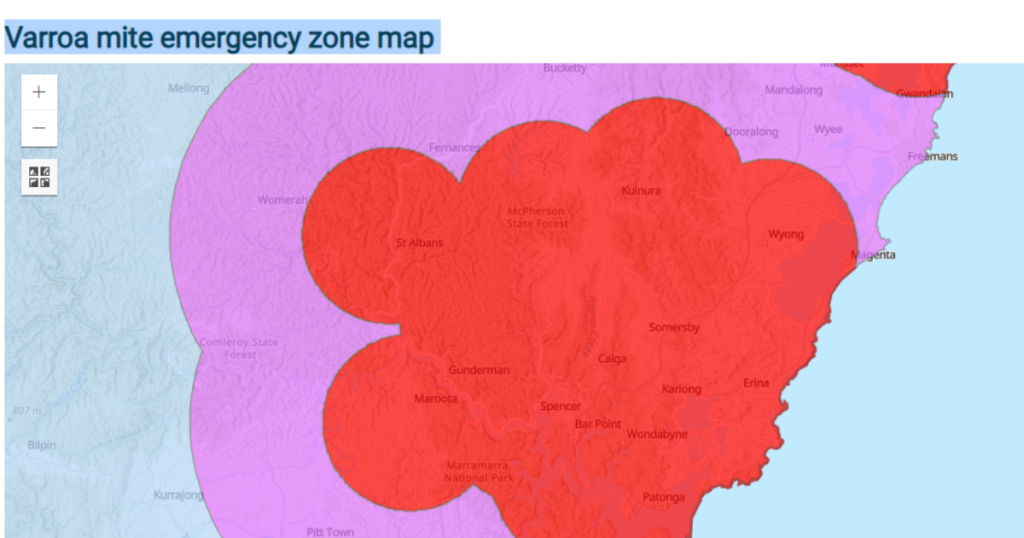Hawkesbury Post contacted all...


Hawkesbury Post contacted all...

In a heartwarming recognition of community...

After more than two decades of dedicated service, the...
Hawkesbury orchard farmer John Christie, the steward of a 100-year-old family business, finds himself in the midst of an uncertain future. The relentless Varroa mite infestation threatens the very survival of his fruit trees, leaving him grappling with the possibility of an orchard devoid of pollinators. As the government races to combat the mites’ devastating spread, Christie’s pleas for alternatives have fallen on deaf ears, intensifying the doubts surrounding his farm’s fate.
For generations, Christie’s Canoelands Orchards has been a cornerstone of the Hawkesbury region, supplying Sydney with fresh stone fruit, citrus fruit, apples and berries. Key to the success of his operation has been the presence of ten beehives, diligently pollinating the trees until the end of spring. However, on Monday night, the Department of Primary Industries (DPI) dealt a severe blow to Christie’s livelihood, exterminating all his bees – without even testing for the presence of the Varroa mite.
“It’s a joke, it’s just laughable what the DPI are doing. The poor lady who came out here on the night to exterminate them, she left here shattered,” Christie said.
Although no signs of the mite were found in Canoelands Orchards’ hives, the farm’s location within the red zone triggered the eradication. Even now, baiting operations are underway to eliminate wild bees in the vicinity. Christie, informed by the DPI two weeks earlier of the impending fate of his bees, struggles to comprehend the agency’s actions.

The hives were doused in petrol and wrapped in plastic and the bees were left to die
The hasty extermination, conducted without testing or verification, has left him shattered, unable to fathom the potential consequences for his farm’s survival. The eradication zone is growing and now covers a massive 300 km strip north and south of Newcastle and 140 km west to Denman. Under the DPI’s strategy all honeybees within this area have or will be exterminated whether or not they have the mite.
Christie had implored the DPI to conduct tests for the mite before exterminating the bees. He proposed the use of monitoring strips within the hives, advocating for eradication only upon confirmation of the Varroa mite’s presence. Sadly, his pleas fell on deaf ears. The farmer’s disappointment and frustration are palpable, as he bemoans the agency’s incompetence and its failure to prioritize his farm’s well-being. “They just killed them without checking (for the mite).” They just put petrol on them, wrapped them up in glad wrap and left them to die.”
Blaming the DPI’s negligence at the Port of Newcastle, Christie holds the authorities responsible for allowing the mite’s undetected entry into the country. The infrequent hive checks at the port facilitated the mite’s spread, leaving countless beekeepers, including Christie, to suffer the consequences. Joined by his daughter-in-law, Jaime, the family expresses profound heartbreak over the loss of their bees and calls for more proactive measures to prevent the mite’s initial spread.
“Our bees are being killed. Our hearts are broken!! There is no sign of the mite in our hives. ….Although we understand the threat and the requirement for drastic action, if more was done to ensure that this didn’t spread in the first place we would not be in this position. This is just so sad,” she said.

The Varroa mite has spread hundreds of kilometres from Newcastle.

As the Varroa mite continues to wreak havoc across New South Wales, Christie’s plight is representative of numerous bee farmers facing an uncertain future. The DPI’s attempts to contain the mite by euthanizing infested hives and establishing control zones have left those outside the designated areas in a state of fear and uncertainty. The potential decimation of pollinators could spell disaster for fruit and vegetable production, exacerbating concerns over rising food prices and the broader implications for agricultural industries valued at billions of dollars annually.
For Christie he and his family now stand at a crossroads, uncertain of what lies ahead. Without bees to pollinate his fruit trees, the future of his farm and trees remains uncertain.
“I don’t know what’s going to happen to my farm now without the bees. It hasn’t happened before. I hope – and that’s all I can do – that I get a crop from other insects but I do not know. I am so disappointed, shattered in fact that they didn’t come to test,” Christie said.
The DPI did not respond to the HP’s request for comment.
